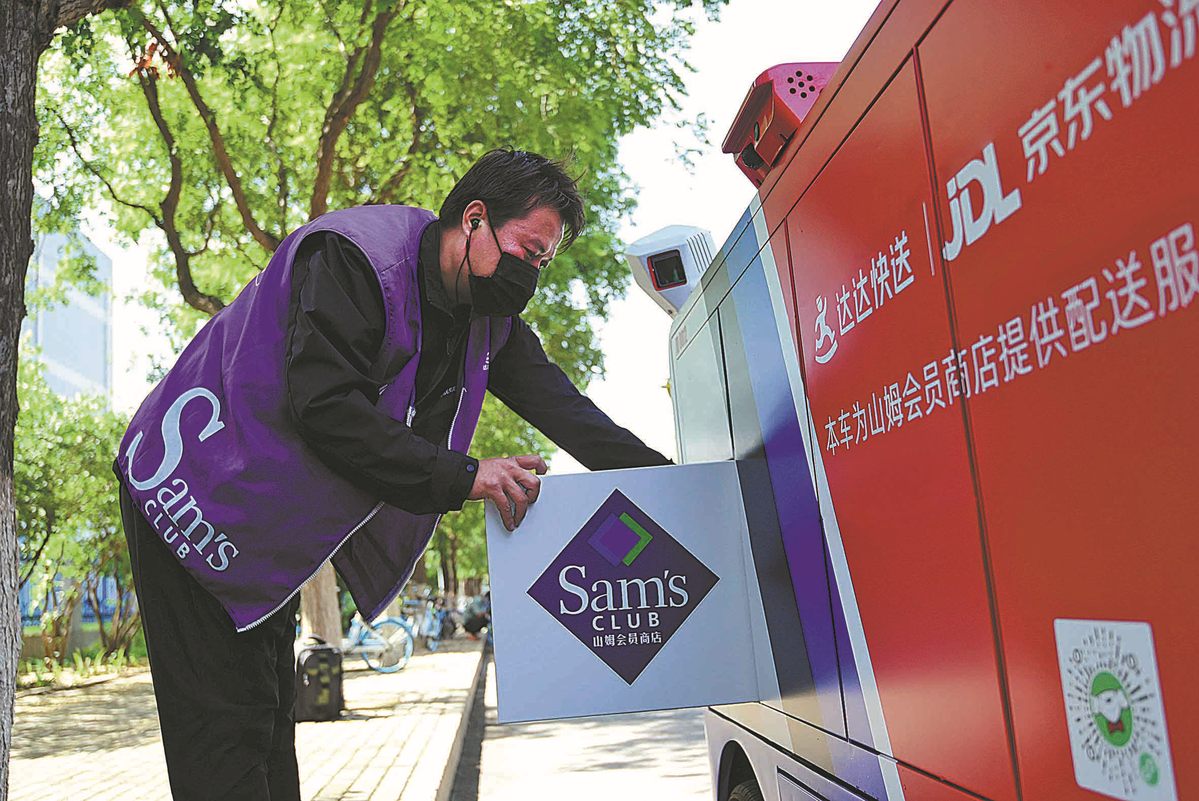Autonomous delivery efforts stepped up


Chinese technology companies are strengthening efforts to expand autonomous deliveries as part of a broader drive to enhance logistics efficiency, lower delivery costs and gain an edge in a fiercely competitive market.
Dada Group, one of the country's largest local on-demand delivery and retail platforms, is accelerating use of unmanned delivery vehicles.
Its affiliated company Dada Now recently started providing unmanned delivery services for Sam's Club, a membership warehouse club owned by Walmart.
Dada Now and JD Logistics, the delivery arm of e-commerce giant JD, customized autonomous delivery vehicles for Sam's Club. Two such vehicles have been deployed at the Sam's Club warehouse in Disheng South Street in Beijing's Daxing district, providing services to surrounding neighborhoods.
Customers receive hourly deliveries when placing orders through the Sam's Club app or JD Daojia.
Sam's Club said its high-end membership retail brand's e-commerce business is witnessing rapid growth, and cooperation with Dada Now is expected to improve delivery efficiency.
Philip Kuai, founder, chairman and CEO of Dada Group, said, "We believe the use of unmanned vehicles for on-demand deliveries is paramount to improving our operational efficiency and consumer shopping experience."
In July, Dada launched an autonomous open delivery platform that has been adopted by JD's supermarket chain 7Fresh and Yonghui Supermarket.
The platform aims to help popularize the use of unmanned delivery vehicles and establish an autonomous delivery system for on-demand services.
It also distributes orders automatically for supermarkets, manages the loading of packages, maintains the normal operations of orders, dispatches unmanned vehicles and plans routes to ensure these vehicles deliver orders efficiently.
Kuai said, "Our open platform accelerates the application of unmanned delivery in the on-demand retail industry. Such delivery powered by the platform is being trialed in some districts of Beijing and Shanghai."
In the short term, autonomous delivery will be used to supplement manual delivery and help alleviate capacity constraints, especially during peak order seasons or in extreme weather conditions, Kuai said, adding that the company will significantly reduce delivery costs in the long term as use increases.
Compared with traditional deliveries, unmanned ones offer lower costs and increased carrying capacity and safety. According to experts, they are also a viable alternative to addressing challenges such as rising labor costs and a shortage of couriers as the on-demand delivery industry experiences rapid growth.
In addition to autonomous vehicles, drones have been used for deliveries, and JD has invested heavily in drone logistics in recent years.
In 2016, the company, which is based in Beijing, used drones to deliver online orders to rural shoppers in Jiangsu province, as it started to use unmanned aerial devices for such purposes.
The following year, it used drones to regularly deliver packages in Xi'an, capital of Shaanxi province, during the June 18 shopping festival.
Xiao Jun, vice-president of JD and president of JD-X, the company's research and logistics innovation lab, said, "As we push the boundaries of autonomous delivery technology and explore its use in a wider range of applications, from e-commerce to humanitarian support, we believe it will continue to bring significant benefits to people around the world."
Lu Zhenwang, CEO of Wanqing Consultancy in Shanghai, said that in view of the current limitations on autonomous driving technologies, and with complicated traffic situations, unmanned delivery services are being used in some designated areas and venues such as hotels, supermarkets and universities.
Leading Chinese technology companies have invested heavily in the intelligent logistics sector on driverless cars, drones and robots to gain the upper hand amid fierce competition, Lu said.
However, he added that it will take a long time for unmanned delivery services to become commercialized on a large scale.




































